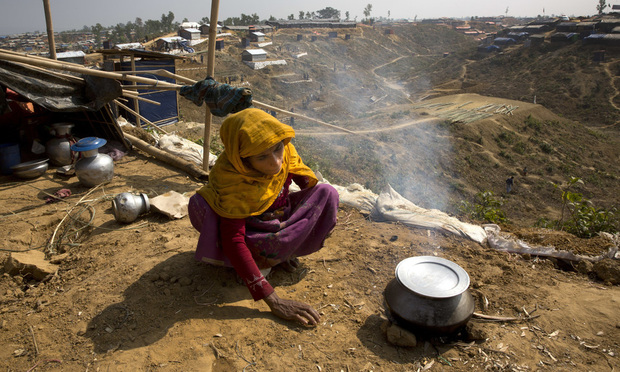We Need #HerToo For the Women Left Behind, Reed Smith Lawyer Says
If you ask a displaced woman about #MeToo, she probably won't know what it is. Why should she be excluded?
March 07, 2018 at 03:38 PM
4 minute read

As a human rights lawyer, I've interviewed thousands of women displaced by war, violence and natural disaster. The common thread running through these interviews is gender-based violence. As I've watched the #MeToo movement gain momentum as a symbol of women's empowerment, I've asked myself what it has to do with refugee women? Not much, I'm afraid. If you ask a displaced woman about #MeToo, she probably won't know what it is. Why should she be excluded? If now is the time to empower women, shouldn't the #MeToo movement include her too?
You know without my telling you that refugee women are exploited in the labor market. Many work as domestic servants. Last month, a Syrian woman in Jordan told me her employer demanded sex from her. When she refused, he accused her of stealing from him and threatened to have her arrested. She didn't report him because the imbalance of power was too great. An Iraqi refugee told me a wealthy man offered her work. For twelve hours a day she cleaned his house, cooked for him and did his laundry. On the last day of the week, he told her she hadn't done a good job and he refused to pay her. She didn't report the crime. The risk of working without documents is deportation.
No one is more vulnerable than a refugee widow with young children to feed. Many Syrian and Iraqi refugees became brides at the age of thirteen or fourteen. Some people attach a judgment to the issue of early marriage. I did. But this judgment isn't going to undo a cultural practice that has existed for centuries, so why not focus on what's in front of us? Many of these brides are now war widows with young children. If a widow is lucky, her brother or uncle will help her. But anyone who's followed the war in Syria knows the impact on men. It's more likely our young widow is supporting an amputee relative, along with a mother with a glass eye, and a father with high blood pressure. This is her reality after nearly a decade of war. How can she survive?
If you go to certain neighborhoods after dark, you'll find her standing on the corner waiting for work. They're not doing washing and cooking jobs, but something more soul crushing. If she doesn't take too many nights off she'll earn enough to pay rent on a rat-infested room with no heat. Where's the #MeToo movement for her?
There's another thing that happens. Refugee women are being violated in their tents, assaulted on their way to the latrine or behind the camp security building. Two days ago, I got a call from one of our field assistants who said a gang of men attacked a 16-year old girl on her way to buy medicine for her sick mother. This happens every hour, every day, in every part of the world where there are refugees and displaced women and girls. The most despicable perpetrators are aid workers and peacekeepers that prey upon refugees living in extreme poverty. The tragic thing is that most of us know about these abuses—they're widely reported—but we feel helpless to do anything about them. We resort to knitting pink hats and marching on the capital. Do we deserve praise for these actions? Yes. Do they help the refugee girl raped in her tent last night? Not so much.
Recently the United Nations came up with more themes for International Women's Day—PeaceforProgress and the TimeisNow. These are good. They invoke optimism. But we need more than slogans and marches. We need the community of nations to reopen their borders to refugees. We need special protection programs for victims of gender-based violence. We need funding to alleviate the suffering of refugee women trying to survive on their own. We need employers to create job opportunities so women are not forced to work in the shadows, or trade their bodies for food. We need to demand justice for refugees who are victims of gender-based violence and hold perpetrators accountable.
These are ideas of some of the best voices in the field. We need to turn ideas into action. And we need to change the hash tag from #MeToo to #HerToo. Because millions of vulnerable women in the world are excluded, and none of us want to be part of a movement based on race, privilege or the part of the world we come from. #HerToo
Pro Bono Counsel Jayne E. Fleming leads Reed Smith's firmwide Human Rights team, representing victims of persecution and torture worldwide in the legal, medical and social issues refugees face daily.
This content has been archived. It is available through our partners, LexisNexis® and Bloomberg Law.
To view this content, please continue to their sites.
Not a Lexis Subscriber?
Subscribe Now
Not a Bloomberg Law Subscriber?
Subscribe Now
NOT FOR REPRINT
© 2025 ALM Global, LLC, All Rights Reserved. Request academic re-use from www.copyright.com. All other uses, submit a request to [email protected]. For more information visit Asset & Logo Licensing.
You Might Like
View All
Switching Positions: US Solicitors General and Climate Change Lawsuits
6 minute read
Jimmy Carter’s 1974 Law Day Speech: A Call for Lawyers to Do the Public Good
14 minute readTrending Stories
- 1Supreme Court Appears to Lean Toward Letting TikTok Ban Take Effect
- 2Standing Spat: Split 2nd Circuit Lets Challenge to Pfizer Diversity Program Proceed
- 3Judge Jablonski and Chief Justice Rabner Both Acted Completely Properly
- 4About Face: Court Takes Up Boeing Suit It Had Rejected
- 5Prosecutors Seek 15 Years in Prison for Ex-US Sen. Robert Menendez
Who Got The Work
Michael G. Bongiorno, Andrew Scott Dulberg and Elizabeth E. Driscoll from Wilmer Cutler Pickering Hale and Dorr have stepped in to represent Symbotic Inc., an A.I.-enabled technology platform that focuses on increasing supply chain efficiency, and other defendants in a pending shareholder derivative lawsuit. The case, filed Oct. 2 in Massachusetts District Court by the Brown Law Firm on behalf of Stephen Austen, accuses certain officers and directors of misleading investors in regard to Symbotic's potential for margin growth by failing to disclose that the company was not equipped to timely deploy its systems or manage expenses through project delays. The case, assigned to U.S. District Judge Nathaniel M. Gorton, is 1:24-cv-12522, Austen v. Cohen et al.
Who Got The Work
Edmund Polubinski and Marie Killmond of Davis Polk & Wardwell have entered appearances for data platform software development company MongoDB and other defendants in a pending shareholder derivative lawsuit. The action, filed Oct. 7 in New York Southern District Court by the Brown Law Firm, accuses the company's directors and/or officers of falsely expressing confidence in the company’s restructuring of its sales incentive plan and downplaying the severity of decreases in its upfront commitments. The case is 1:24-cv-07594, Roy v. Ittycheria et al.
Who Got The Work
Amy O. Bruchs and Kurt F. Ellison of Michael Best & Friedrich have entered appearances for Epic Systems Corp. in a pending employment discrimination lawsuit. The suit was filed Sept. 7 in Wisconsin Western District Court by Levine Eisberner LLC and Siri & Glimstad on behalf of a project manager who claims that he was wrongfully terminated after applying for a religious exemption to the defendant's COVID-19 vaccine mandate. The case, assigned to U.S. Magistrate Judge Anita Marie Boor, is 3:24-cv-00630, Secker, Nathan v. Epic Systems Corporation.
Who Got The Work
David X. Sullivan, Thomas J. Finn and Gregory A. Hall from McCarter & English have entered appearances for Sunrun Installation Services in a pending civil rights lawsuit. The complaint was filed Sept. 4 in Connecticut District Court by attorney Robert M. Berke on behalf of former employee George Edward Steins, who was arrested and charged with employing an unregistered home improvement salesperson. The complaint alleges that had Sunrun informed the Connecticut Department of Consumer Protection that the plaintiff's employment had ended in 2017 and that he no longer held Sunrun's home improvement contractor license, he would not have been hit with charges, which were dismissed in May 2024. The case, assigned to U.S. District Judge Jeffrey A. Meyer, is 3:24-cv-01423, Steins v. Sunrun, Inc. et al.
Who Got The Work
Greenberg Traurig shareholder Joshua L. Raskin has entered an appearance for boohoo.com UK Ltd. in a pending patent infringement lawsuit. The suit, filed Sept. 3 in Texas Eastern District Court by Rozier Hardt McDonough on behalf of Alto Dynamics, asserts five patents related to an online shopping platform. The case, assigned to U.S. District Judge Rodney Gilstrap, is 2:24-cv-00719, Alto Dynamics, LLC v. boohoo.com UK Limited.
Featured Firms
Law Offices of Gary Martin Hays & Associates, P.C.
(470) 294-1674
Law Offices of Mark E. Salomone
(857) 444-6468
Smith & Hassler
(713) 739-1250












